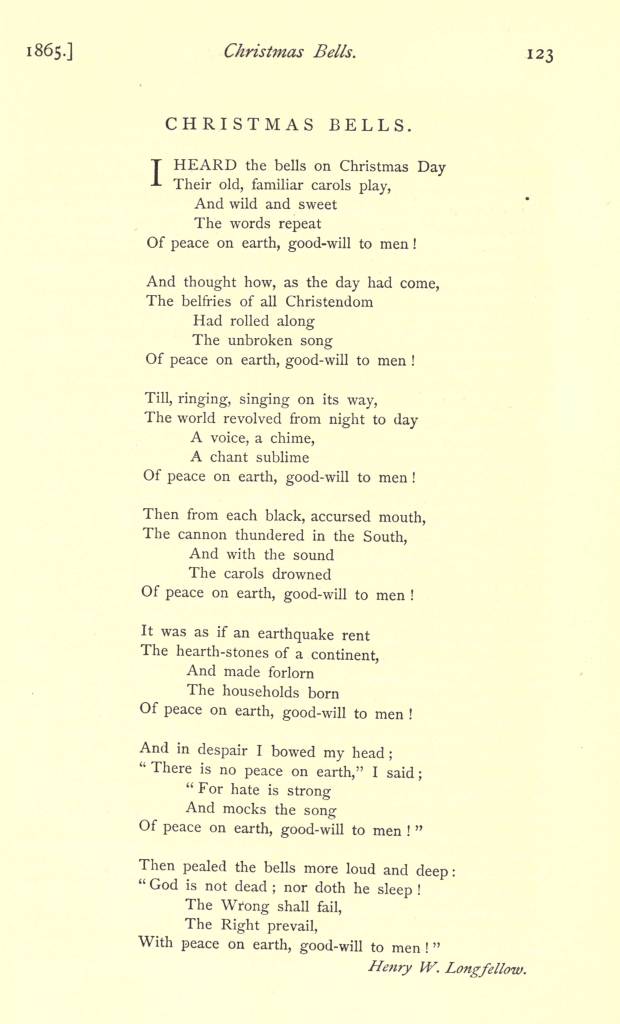Merry Christmas! I hope today finds you filled with comfort and joy, however you celebrate the season. Thank you for reading these stories, and I hope they have enriched your holidays in some way. By the way, as always, these features will continue until the end of the year, so stay tuned.
The Christmas promise of “peace on earth, good will toward men” has been elusive throughout human history. Yet even in the midst of war, some still maintain the hope that this lofty goal can happen. My Christmas Song of the Day for December 25 came from one of America’s greatest poets during the height of one of the most terrible times in U.S. history — the Civil War.
On Christmas Day in 1863 (or 1864 — sources vary), Henry Wadsworth Longfellow (1807-1882) was consumed by grief. His beloved second wife, Frances Elizabeth Appleton, died on July 10, 1861 in a horrible accident at home in which her dress caught fire; Longfellow never recovered from the loss. Then, in 1863, against his wishes, his eldest son, Charles Appleton Longfellow, joined the Union cause in the Civil War and was critically wounded in the Battle of Mine Run (New Hope Church), which took place in Orange County, Virginia from November 27 to December 2, 1863. (In the 1864 origin story, Longfellow also was sorrowful over the death of his friend, author Nathaniel Hawthorne, who died May 19, 1864.) Wondering if the accursed war would ever end, but hopeful that it would, Longfellow wrote a seven-stanza poem he called “Christmas Bells.” It first appeared in print in the February 1865 edition of Our Young Folks, a literary magazine for children aged 10-18 published in Boston.
Today, we know this poem as “I Heard the Bells on Christmas Day.”

Two of the seven verses are specific to the war and are rarely sung today. But the other five are, although sometimes the order is shuffled.
Longfellow’s poem has been set to music several times. The first known to do so was English composer and organist John Baptiste Calkin (1827-1905), who in 1872 melded it to a melody known as “Waltham,” which Calkin had composed no later than 1848. This is the version most often found in hymnals, as it has long since passed into the public domain.
Johnny Cash (1932-2003) recorded a nice version of the Calkin melody for his 1963 album The Christmas Spirit.
In 1956, Johnny Marks (1909-1985), already well known as the composer of “Rudolph, the Red-Nosed Reindeer,” set Longfellow’s words to a new melody. This may be the most familiar version today. Bing Crosby (1903-1977) was the first to record it, on one of his last singles for the Decca label before he became a musical free agent. I am most familiar with it through the 1958 version by Harry Belafonte (born 1927), who recorded it for his album To Wish You a Merry Christmas; a slightly edited version was released as a 45 that year.
Here’s the Belafonte version of the Marks melody, which was the first I heard.
More than 50 years later, Mark Hall (born 1969), lead singer of Contemporary Christian band Casting Crowns, teamed with guitarist Dale Oliver (born 1970) to create yet another new melody for “I Heard the Bells on Christmas Day.” This version, which is an interpolation of four stanzas of the Longfellow poem with some linking words, appeared on Casting Crowns’ 2008 Christmas album Peace on Earth and hit #1 on the Billboard Top Christian Songs chart that year.
Whichever version you prefer, or if you find meaning in all of them as I do, Merry Christmas!
(A version of this entry was my Facebook-only Christmas Song of the Day for December 8, 2014.)